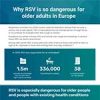RSV in adults
HPP produced a policy report and infographic to raise awareness of respiratory syncytial virus (RSV) in adults and to highlight opportunities to reduce its burden through prevention, diagnosis and care.

Context
RSV is a common respiratory virus that can cause serious illness in young children and some groups of adults, including older adults and those with certain underlying health conditions. But the impact of RSV on adults is often underestimated, leading to inadequate prevention and management.
RSV is a common cause of lower respiratory tract infections around the world. It is often misunderstood to be only a childhood illness, even by healthcare professionals. This may be because in healthy adults, RSV typically causes mild symptoms that are indistinguishable from those of other common respiratory infections, such as the common cold. However, in older adults and those with underlying health conditions, RSV can cause a severe infection, such as pneumonia. It can result in hospitalisation and may have a higher mortality rate than flu.
Before the COVID-19 pandemic, RSV was estimated to account for one in ten acute respiratory episodes in adults in Europe. Virus control measures put in place during the pandemic are thought to have affected the seasonal pattern and spread of RSV, and we have recently seen unusual spikes in RSV infections that have put considerable extra pressure on health systems. However, the chronic under-reporting of RSV infections, and the inconsistent and often insufficient data collection and surveillance in Europe, mean that the burden of the disease is unclear and likely to be underestimated.
As a result of low awareness and inadequate surveillance, many adults at risk of severe disease may not benefit from key preventive measures. Currently, prevention in adults depends on virus control measures, such as hand-washing, personal protective equipment and isolation within healthcare settings. But the implementation of these strategies is reliant on adequate awareness among healthcare professionals and the public. When an adult RSV vaccine becomes available – which is expected to occur in the near to medium term – awareness, data collection and surveillance will become even more important in guiding the implementation of new vaccination programmes.
What we’ve achieved
In 2022, HPP carried out extensive desk research and interviewed a range of experts from across Europe to identify policy priorities for addressing the burden of RSV in adults – both now and in the future. Given that there are currently very few policies or guidelines specific to RSV in Europe, we hope that the project outputs will help raise the profile of RSV as an important respiratory virus and guide decision-makers to take action to address it.
During RSV Awareness Month (October) 2022, we published an infographic to raise awareness of RSV and why it is dangerous for older adults.
In 2023, we published a report that sets out five policy priorities for improving the prevention and management of RSV in adults across Europe. In addition to taking a comprehensive view of the current factors affecting RSV prevention and management, the report looks at key considerations for the future, in anticipation of new vaccinations and treatments being introduced. The report has been shared directly with public health teams at the European Union Directorate-General for Health and Food Safety.
Key partners and stakeholders
We consulted with the following expert stakeholders, who also volunteered their time to be interviewed:
- Elizabeth Adams, President, European Federation of Nurses Associations
- Katrina Bouzanis, Program Manager, International Federation on Ageing
- Daphne Holt, Chair, Coalition for Life-Course Immunisation
- Lies Kriek, Chair, RSV Patient Network, Patient Advisory Board, ReSViNET Foundation
- Paul Loubet, Clinician, Infectious Diseases Department, Nîmes Academic Hospital, University of Montpellier, France
- Antoni Torres Martí, Chief, Respiratory Intensive Care Unit, Hospital Clinic of Barcelona, Spain; Professor of Medicine, University of Barcelona, Spain
- Ted van Essen, retired general practitioner, the Netherlands; Chair, Dutch Influenza Foundation
- Roxie van Lieshout, Scientific Networks Associate, ReSViNET
- Marc van Ranst, Professor of Virology, Katholieke Universiteit Leuven, Belgium
- Dexter Wiseman, Clinical Research Fellow, National Heart and Lung Institute, UK; Specialist Registrar, Chelsea and Westminster Hospital NHS Trust, UK
Project funding
This project was initiated and funded by Janssen Pharmaceutica NV. None of the content is specific nor biased towards any particular treatment or therapy. HPP had full editorial independence from the funder in developing the policy report and infographic.

